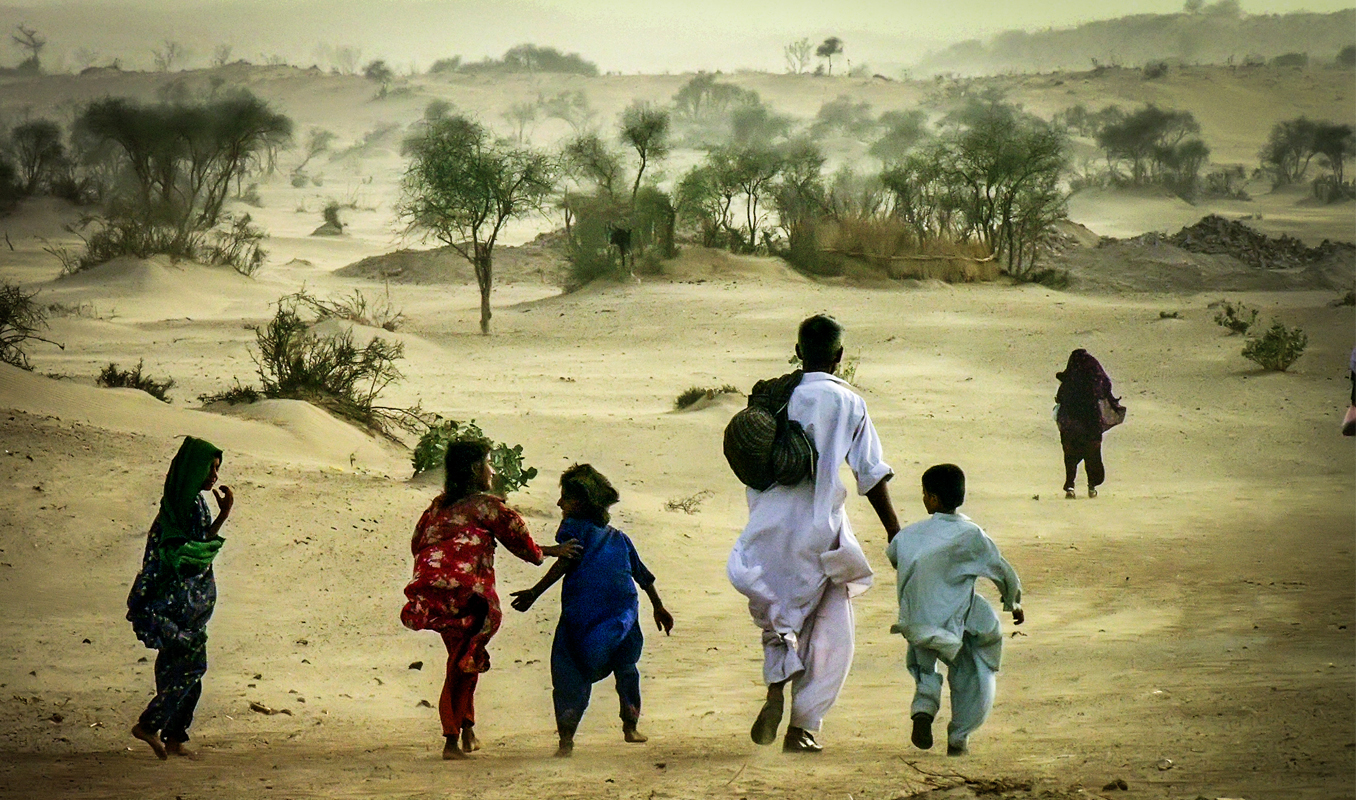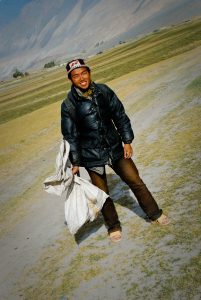
Agustinus Wibowo is an Indonesian travel writer and travel photographer. His work includes Selimut Debu (A Blanket of Dust, 2010), Garis Batas (Borderlines: A Journey through Central Asia, 2011) and Titik Nol(Ground Zero, 2013). He has pioneered a new genre in Indonesian travel literature by allowing readers to experience the writer’s physical, spiritual and emotional journey as they contemplate their own conflicts and anxieties. The English version of Titik Nol, Ground Zero: When Journey Takes You Home, was released in 2015. Website
Agustinus Wibowo was writer in residence at the National Centre for Writing in August 2019 and ran two travel writing workshops with Suzanne Joinson. His residency was generously supported by BEKRAF, the National Organising Committee for the Indonesia Market Focus at London Book Fair 2019, Virtuago and the British Council.


![]()
In the Thar desert in southern Pakistan, it had not rained for four years in a row. People were having to walk barefoot for miles on hot sand to get just a few drops of water. In the summer that year, a disastrous heatwave swept through Pakistan, causing thousands of deaths across the country. At this very unfortunate moment, and in this very arid desert, my hepatitis recurred. That day, I was visiting someone I had never met before. Arriving at his house, I vomited violently and collapsed on the floor. My eyes were yellow. My whole body was yellow.
“I was visiting someone I had never met before.”
Imagine if this ever happened to you. A stranger comes to visit your house, and he has a dangerous contagious disease—what would you do? You might politely ask him to leave. Or you might take him to the nearest hospital, and bid him farewell there. But on the contrary, what my Pakistani host did was to prepare the best bed in the best room in his house, as well as the best food he could manage, especially for me. He said, “You can stay here as long as you want. This house is your house.”
I stayed in his house for at least three weeks until I finally fully recovered. I was very grateful, but at the same time, embarrassed. I couldn’t match his kindness in helping those around me. Not even a tenth of it.
“How can I repay you for all of this?” I asked.
“Don’t worry about it,” the man said, with a gentle smile on his face. “In life, what’s important isn’t how much you have, but how much you share. And also, how you make your life meaningful to others.”
“By writing, I can share the stories that I have experienced myself or have heard along the road.”
His words were the most precious lesson I learnt during my journey. He had showed me with his actions that the greatest meaning of life is about sharing.
Travelling is the greatest university of life, where wisdom can be found in unexpected places and taught by unexpected people. That is what exactly inspired me to be a travel writer. By travelling, I have the opportunity to listen to so many stories from so many people I meet on my journeys. And by writing, I can share the stories that I have experienced myself or have heard along the road with a wider audience.
 Stories shared through writing give voice to the voiceless. Stories can enlighten us, showing that that people who live in exotic places, or who live in troubled countries, or who practise different religions and traditions, are just like us. They also laugh at the same jokes, cry and grieve for the same reasons, and pursue the same happiness in their life. They are the same humans as we are.
Stories shared through writing give voice to the voiceless. Stories can enlighten us, showing that that people who live in exotic places, or who live in troubled countries, or who practise different religions and traditions, are just like us. They also laugh at the same jokes, cry and grieve for the same reasons, and pursue the same happiness in their life. They are the same humans as we are.
Stories from the road can also affect readers in different ways. Some readers may find that, after reading the stories, they change in the way they perceive the world around them. They may also learn to take their life less for granted, to be grateful for what they are, and to develop compassion based on the universal values of humanity. They might even be inspired to take action to change our world for the better. Nothing brings more happiness to a writer than to hear from his readers about how his stories have changed them.
Sharing indeed makes you happy.
But are our travel experiences really worth sharing? And how should we share them to make people interested? Storytelling is not only about what you are sharing, but also how you share it. Here are some little tips to make our travel experiences more meaningful, not only to ourselves, but also to so many others.
Travel Writing Tips
- Travel with purpose. If you embark on a journey with some questions to which you want to find the answers, you will be able to focus your time and energy to learn from the journey.
- Observe deeply and maintain a high level of curiosity. Use all your senses to observe the world around you, and keep questioning the meaning of your experiences.
- Before writing, know first what message you want to convey to your readers. It will help you to produce powerful stories that resonate in the mind of the readers.







